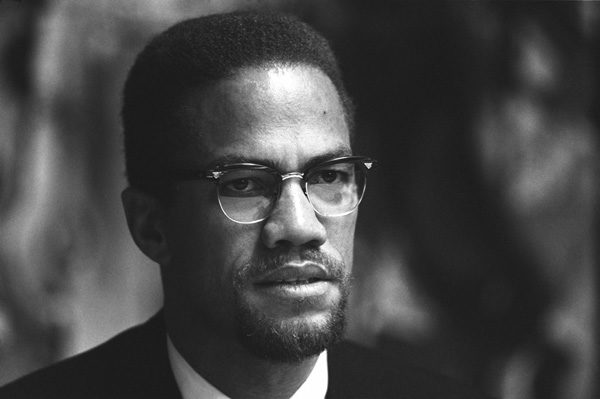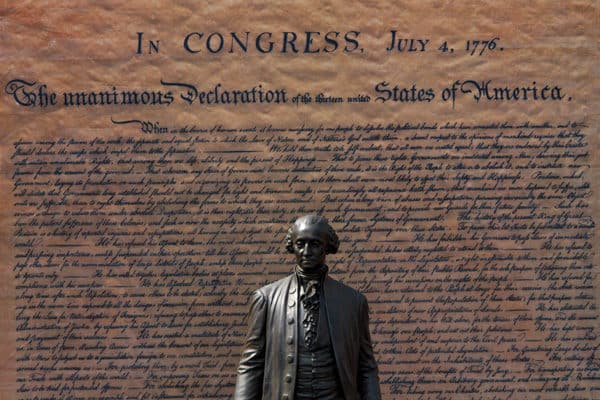Ending “Identity Politics” Requires White Identity
Gregory Hood, American Renaissance, February 15, 2019

American conservatives constantly lecture their followers about the dangers of “identity politics,” and Tucker Carlson is no exception. He recently denounced identity politics because it could lead to whites organizing on racial lines and the “Balkanization” of the American nation.
The opposite is true. The American nation was built upon a foundation of white identity — and America will crumble unless whites defend their race.
Mr. Carlson didn’t directly criticize white advocates. He and his guest, Dr. David Azerrad of the Heritage Foundation, didn’t even acknowledge white advocates’ existence. Instead, both suggested “white nationalism” would emerge in the future because of the Left’s current embrace of identity politics.
To show the extent of that embrace, Mr. Carlson began his segment by deconstructing failed Democrat gubernatorial candidate Stacey Abrams’s recent piece in Foreign Affairs, “Identity Politics Strengthens Democracy”:
‘The marginalized did not create identity politics: their identities have been forced on them by dominant groups, and politics is the most effective method of revolt,’ Miss Abrams writes. ‘By embracing identity and its prickly, uncomfortable contours, Americans will become more likely to grow as one,’ she concludes.
“The less we have in common, the more united we will be,” Mr. Carlson commented, sarcastically summarizing Abrams’s position. “Even Stacey Abrams doesn’t really believe it; nobody does,” he added.
Mr. Carlson observed that Miss Abrams’s model of identity politics involved the “marginalized” uniting against the “dominant” group using the language of war and revolt. Echoing Steve Sailer, Tucker Carlson argued that the Left is defined by a “highly unstable collection of interest groups” united by a common enemy, white men. Mr. Carlson denounced a conception of politics that deliberately pits Americans against each other. “No election is worth the hatred and division of identity politics, not if you plan to live here, anyway,” he said.
Though he didn’t mention it in the segment, Mr. Carlson was referencing his guest Dr. Azerrad’s recently released report on the origin of identity politics, “The Promises and Perils of Identity Politics.” “Identity politics,” Dr. Azerrad says, is not merely tribalism; it relies upon a “politics of victimization” that gives the supposedly oppressed group a moral claim on the larger society. Though he does not directly reference it, this analysis coincides with Bradley Campbell and Jason Manning’s 2014 theory that there is now a “victimhood culture” distinguished from the “honor cultures” and “dignity cultures” that defined morality in the past. In “victimhood culture,” power derives from claiming an “oppressed” status and appealing to third parties to extract concessions from the “oppressor.”
Dr. Azerrad explains that the term “identity politics” originated in the 1977 Combahee River Collective Statement issued by a black feminist group. He argues that the key to “identity politics” is not identity itself, but oppression. “Identity politics,” he argues, “grows out of the realization that society is comprised of multiple interconnected systems of oppression that decisively shape — and perhaps even determine — the lives of the oppressed.” The American political system is understood to be a system of “white male rule,” and “the struggle between the oppressors and those whom they oppress is the most fundamental dimension of reality.” Indeed, the oppression is so pervasive that without “identity politics,” the oppressed may not even realize their own subjugation. “Intersectionality” is important because “oppression” can operate along several categories such as race and class. In this sense, Marx did not go far enough in understanding oppression.
Dr. Azerrad says Malcolm X “represents the beginnings of identity politics in America,” because he promoted the idea of a common non-white alliance against the white man, who Malcolm X said “is against blacks.” Other identity groups, from Hispanics to homosexuals, share this premise of a “white power structure” oppressing different groups. However, the oppression operates differently among different groups, because some (such as Asians and Hispanics) can “assimilate” at “the price of their authentic identity.” The struggle for the oppressed, then, is to resist “assimilation and integration” into the white male mainstream. While some movements seek an independent homeland (such as Aztlán), and others seek a radically transformed America, all identitarians (a term Dr. Azerrad applies to identity-politics activists) believe “America, as it is constituted, offers no hope for women and minorities.”

Malcolm X (Credit Image: © MediaDrum via ZUMA Press)
Dr. Azerrad says many identitarians ultimately adopted the third way between integration and revolution by accepting the identitarian critique of the system but working “within the system to advance their own sectarian interests.” The Black Power movement becomes the archetypal model. “America, in this presentation, is not a country, but a federation of ethnic groups competing against one another to maximize their power and, by extension, their wealth and status,” writes Dr. Azerrad, summarizing the work of Black Power theoreticians Stokely Carmichael and Charles V. Hamilton. America is not a country, but a battlefield, with power instead of morality or justice determining the victor. Indeed, words simply “mean whatever those in power say they mean,” according to this vision. Dr. Azerrad draws a direct line between the pessimistic vision of Black Power to “America’s most prominent identitarian, Ta-Nehisi Coates,” who simultaneously tells his son that real equality with other Americans is impossible but writes elsewhere that reparations could lead to “spiritual renewal.”
“Abandon hope all ye who enter here — except when making your demands,” Dr. Azerrad says, summarizing the identitarian position.
Dr. Azerrad shows the tactics of today’s race hustlers follow inevitably from their premises. The first set of demands flows from the desire for “recognition,” which requires the rewriting of textbooks, the recreation of history, and ultimately the repression of speech that demeans minority communities. What’s more, minorities cannot be held responsible for their own negative behavior because of their oppressed status. The second set of demands results from the desire for governmental redistribution of wealth. Ultimately, what allows all these demands to succeed is the rise of white guilt. “Whites, particularly liberal whites, have been quite adept at condemning not only themselves and their own system, but also their own country, their own past, their own civilization, their own religion, their own race, and their own gender,” Dr. Azerrad writes. He says that the critique of whites is so widespread that almost any charge against them, “no matter how offensive, violent or untrue,” can be made with “impunity.”
Ultimately, he says such white guilt is unsustainable and that the “identitarians will have actually produced that which they claim to oppose” — overt white advocacy. Dr. Azerrad elaborated on this conclusion at more length during his segment on Mr. Carlson’s show, portraying identity politics as something that works in the “short term.” He described the day whites stop going along with it in apocalyptic terms. “[T]hen you get some form of Yugoslavia or Rwanda, you get Balkanization, and you get ethnic tribalism, groups fighting against one another,” he warned, with Mr. Carlson agreeing this is “something to fear.”
“Diversity is not a strength in politics,” said Dr. Azerrad. “Strength in politics is unity.” He argued that though class differences have always existed, identity politics and open borders are far more dangerous, making it impossible to maintain a country. He said this did not mean opposition to “hyphenated Americans” but suggested the country needed to “emphasize the commonalities, the shared history, the shared devotion to republican principles, the love of country.” Similarly, in his report, Dr. Azerrad argued for embracing a patriotic, assimilationist, color-blind creed which promises “liberty and justice for all.”
What does this creed really mean? In his report, Dr. Azerrad distinguishes between the pessimistic, zero-sum view advanced by today’s identity-politics campaigners and the more optimistic outlook supposedly put forward by civil-rights campaigners. He suggests that identity politics can be overcome by appealing to America’s founding principles, which “promise equal rights and the equal protection of the law to all its citizens” and do not classify people “according to race, ethnicity, sex, or sexual orientation.” Dr. Azerrad suggests that rather than declaring America inherently racist, “the ideals should be invoked to condemn the unjust practices.” He cites Martin Luther King, Frederick Douglass, and the early feminists to show that framing demands for equality with reference to America’s founding documents holds out “the promise of integration, assimilation, civic friendship, and equal citizenship under the law.”
Yet this isn’t true. Martin Luther King was considerably more radical than contemporary conservatives seem to believe, and his appeals to American symbols were a political tactic, nothing more. Now that King is politically untouchable, progressives are far more open about his socialist beliefs, support for anti-white racial preferences, and revolutionary ambitions. King would almost certainly support today’s identity-politics activists and their demand for “reparations.”

January 18, 1964 – Martin Luther King Jr., left, meets with President Lyndon B. Johnson. (Credit Image: © Yoichi Okamoto/White House/MediaDrum via ZUMA Press)
In his “The Meaning of July Fourth for the Negro” speech, Douglass suggested he wasn’t really an American at all, lecturing his audience on “your” Independence Day. Though he took “encouragement” from American institutions and founding principles, he also trusted in globalization to undermine national independence. “No nation can now shut itself up from the surrounding world and trot round in the same old path of its fathers without interference,” he said. Thus, his American “identity” is dependent on whether the country is fulfilling certain abstract ideals that the larger world is moving toward anyway.
Similarly, though early feminists grounded their aspirations in the founding documents, it does not follow that “women’s liberation” is the inevitable outgrowth of America’s ideals. The Founding Fathers would certainly be horrified to see where their supposed “principles” led.
Dr. Azerrad seems to mean well, yet his vision implies America’s identity is dependent on meeting the never-ending grievances of self-identified victims lest Americans “betray” their founding ideals. Aside from including more patriotic window dressing and rhetorical appeals to the Declaration of Independence, this is no different than what exists today. Furthermore, like King and Douglass before them, non-whites are comfortable making explicit appeals to racial interests while simultaneously claiming “American ideals” necessitate white concessions.
For example, Alexandria Ocasio-Cortez says Hispanics should be exempt from immigration laws but also says America is “special” because everyone who comes here can enjoy the Bill of Rights. Though she’s participating in the political system, this is hardly a successful example of “assimilation” or “integration.” Even Malcolm X, the archetypal “separatist,” ended his life calling for more racial redistribution of wealth and government programs, which is essentially no different from someone such as Keith Ellison. Malcolm X’s previous “separatism” was more honorable and more advantageous to whites.
Dr. Azerrad’s report on identity politics is a must-read for white advocates. However, his solution is unsatisfying, both for whites and non-whites. He correctly notes that identity politics are effective in “making you hate your country, making you despise your past, [and] making you hate your fellow countrymen.” Yet this critique appeals only to whites. Even if cloaked in appeals to the Constitution and Declaration of Independence, the triumphs of American history are overwhelmingly those of white history. For non-whites who don’t see themselves represented by the Founding Fathers, identity politics provide a source of pride and power. Why should non-whites identify with slaveholding Southern plantation owners, Western pioneers, or the Pilgrim Fathers of New England? More importantly, if the current model of politics provides them with concessions, privileges, and psychological tributes, why would non-whites choose “assimilation” into an American identity that vaguely promises “liberty and justice for all,” like Azerrad states?

A statue of Thomas Jefferson in front of a large print of the Declaration of Independence during the Celebration of Freedom ceremony, held annually at Independence Hall where the real document was signed. (Credit Image: © Michael Candelori/ZUMA Wire)
Paradoxically, non-whites are more likely to assimilate into a united American identity if whites assert their own specific racial consciousness. Dr. Azerrad writes movingly that contemporary whites are “not only denied an ethnic or sexual identity worthy of admiration; they are not even permitted to fall back on patriotism and affirm an American identity, America being a wretched country unworthy of any attachment.” Yet this is inevitable if American identity is defined in terms of providing “equality” and “rights” to aggrieved groups, like Dr. Azerrad suggests.
Whites need to defend their history and identity on their own terms, including celebrating the settlement of a new nation in the New World, the conquest of the West, and the creation of a superpower. America is a European outpost in the Western Hemisphere, and its history should be explained in terms of greatness, accomplishment, and power. The minority of non-whites that regard themselves to be “American” must understand they are assimilating into that identity and are a part of a fundamentally European nation. Instead of being granted privileges because of their supposedly oppressed status, being considered American at all is a privilege granted to a minority of non-whites. After all, before civic nationalists can encourage “assimilation,” there must be a strong, unapologetic identity that minorities are expected to embrace. If America is to survive, what is needed is Sam Francis’s proposed cultural “reconquest” of the United States.
Neither Dr. Azerrad nor Mr. Carlson define what the reemergence of a “patriotic, assimilationist, color-blind creed” would entail in policy terms. Presumably, it means combating multiculturalism in both primary school and higher education, abolishing affirmative action, making English the official national language, and protecting existing monuments from being torn down. Though “color-blind,” such policies would necessarily privilege whites’ history and heritage. It’s naive to think such a platform would create a feeling of “unity” among Americans. Such policies would undoubtedly be labeled “white nationalist” by critics. At least some sense of white identity is required so civic nationalists can avoid surrendering when confronted with charges of “racism.”
Unfortunately, Dr. Azerrad and Tucker Carlson are both too pessimistic (or from a white advocate’s position, optimistic) about the inevitable rise of white identity politics. Dr. Azerrad convincingly shows that the “identity politics” used today are not really about identity but about claiming victimization. Whites are unlikely to be ever treated like victims by the media and the power structure. Claims of victimization by whites are usually met with mockery; indeed, critics at Esquire magazine said this very TV segment was just another example of “white victimhood.”
The irony of today’s “identity politics” is that they are premised on a “white male power structure” but ultimately depend on grants of power and patronage from the very power structure that non-white identitarians claim to oppose. White identity politics are more difficult to create than something such as “Black Power” or “queer liberation.” White identity requires an ethos of accomplishment rather than victimization. More importantly, it must be self-reliant rather than directed toward extracting concessions from a fundamentally sympathetic establishment.
Dr. Azerrad’s explanation of identity politics is instructive, but he doesn’t provide the solution. There is no easy way out for whites. America is already a battleground of competing groups, whether civic nationalists like it or not. Without white identity, our people don’t survive — and without whites, neither does America.















